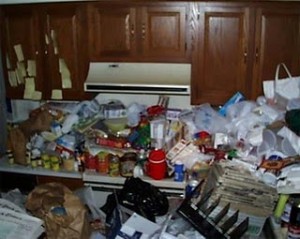 Hoarding is more than being a messy housekeeper or an avid collector. Hoarding usually involves collecting seemingly non-valuable items that overtake living spaces and causes daily problems in functioning and relationships.
Hoarding is more than being a messy housekeeper or an avid collector. Hoarding usually involves collecting seemingly non-valuable items that overtake living spaces and causes daily problems in functioning and relationships.
Hoarding is currently not a diagnosable mental disorder listed in the American Psychiatric Association’s Diagnostic and Statistical Manual of Mental Disorders 4th edition (DSM-IV-TR), but is being considered as an addition to the upcoming 5th edition.
You may have a problem with Hoarding if you can answer YES to these questions:
Does your kitchen or a room in your home look similar to the picture above?
Have you stopped inviting people into your home because of the clutter?
Are you experiencing financial problems from spending money on items you do not use?
Are you able to sleep in your bedroom? Eat in your kitchen or dining room?
Do you have more than four animals living inside your home?
Have family members or friends told you they are concerned about your living conditions?
Is it difficult for you to throw anything away?
Do you collect many different things such as newspapers, dolls, purses, model cars, books?
Do you collect items from other people’s trash or dumpsters?
Are you grieving the loss of a loved one?
Have you stopped socializing with friends and family?
Do you start to clean and end up realizing you only moved one pile to another?
Are you experiencing feelings of being overwhelmed or afraid?
Do you feel disorganized? Do you have trouble focusing on a task?
Are you storing items in a rented storage space or a shed outback in addition to your home?
Are you a perfectionist?
Are you experiencing problems in your relationships with family, friends or co-workers?
5 Tips to Understanding Hoarding:
1. Hoarding is a sign that a person is suffering from emotional or mental distress and in need of counseling to process their thoughts and emotions. People who “hoard” are usually engaging in this behavior as a way to cope with grief, loneliness, or life transitions. They may also be experiencing obsessive thoughts leading to compulsive behaviors known as Obsessive Compulsive Disorder (OCD). Hoarding can begin during childhood or begin at any age in reaction to a life event or experience.
2. Hoarding is not a “cleaning” or “organization” issue. It is a mental health issue. Cleaning and organizing the house for the hoarder and throwing all the “garbage” away does not solve the problem. First, the person who is hoarding must process their emotions and work through the mental health issues. Then, they must be involved in the physical aspect of the “clean up” in order to overcome hoarding successfully.
3. It is common for the person who is hoarding to be in denial that a problem exists, which can cause extreme emotional distress for family members and friends. Counseling usually involves session with family members as well as the person hoarding.
4. Family members and friends may be forced to seek intervention from the police, fire department, health department or child and animal welfare departments if they fear for the safety and health of the person hoarding. Many times, family members feel guilty or do not want to offend their loved one, but if a child, elderly person, or animal’s health and safety is at risk, it is important to involve the proper authorities. Remember, you will be helping your loved one, not hurting them.
5. Hoarders feel an extreme emotional attachment to the things or animals they can’t let go of. Contacting a mental health professional can be the beginning of the process to help a hoarder realize their need for change. Talk to you loved one and tell them how much you care about them and encourage them to seek counseling. Also, sometimes counseling is the only way for a family to heal from the emotional and relational hurt and pain caused by hoarding.
Can a person overcome Hoarding?
Yes, a person can work through their emotional and mental issues and successfully overcome their Hoarding behavior with professional counseling. Hoarding is not a simple problem and sometimes a person can be suffering from depression, anxiety, obsessive compulsive disorder, or other mental health issues.
What if the person Hoarding does not want help?
If you are a loved one of a person who engages in hoarding behavior, you may feel overwhelmed and discouraged from trying to help them. You see the harm this behavior is causing and you want desperately to help! Unfortunately, we can’t change anyone but ourselves, no matter how much we try. It is very important that you establish personal and relational boundaries with your loved one in order to maintain your own mental and emotional health.
Hoarding Resources:
